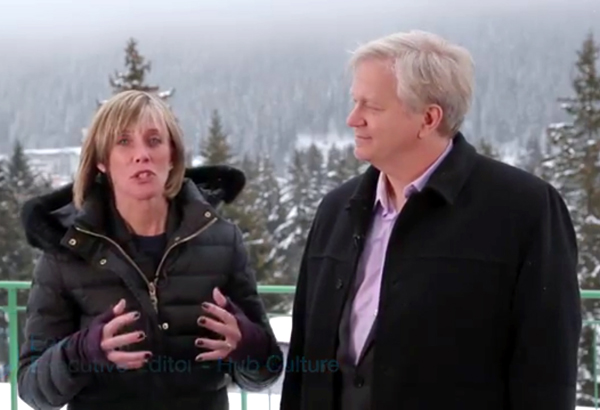The elite of world business and politics get bad news about the state of the world [27 January 2015 | Peter Boyer]
Arriving at Davos, I imagine you’d feel on top of things. Set amid the peaks of the eastern Swiss Alps, at over 1500 metres above sea level this is one of Europe’s most elevated cities.

Physicist, Nobel Laureate and ANU Professor Brian Schmidt, a science panel member at this year’s World Economic Forum, with a WEF interviewer at Davos. PHOTO Davos 2015 Hub Culture
About this time every year the city hosts the World Economic Forum, a self-described “platform for public-private cooperation” where the world’s powerful ponder the state we’re in.
Leading figures at last week’s meeting included the Chinese Premier, Li Keqiang, Prince Andrew and numerous European heads of government, UN secretary-general Ban Ki-Moon, US Secretary of State John Kerry, billionaire philanthropist Bill Gates and billionaire investor George Soros.
Also among the 2500 delegates were the World Bank president and the CEOs of the International Monetary Fund, JPMorgan Chase, Morgan Stanley, Goldman Sachs, General Motors, Microsoft and Google.
The fact that 83 in every 100 delegates were men only adds to the sense of exclusivity at Davos. Rubbing shoulders with such power, it must be hard not to feel important.
Working sessions dealt with things like how to keep society “secure” while stimulating growth and encouraging innovation, what to do about eroding trust in institutions, how to deal with market volatility and what to expect in the 2015 global economy.
The discomfort level might have been raised a smidgin by speeches from World Bank president Jim Yong Kim and former US vice-president Al Gore about the pivotal Paris climate summit in December. But one set of briefings should have been exceptionally sobering.
The subject was the outcome of several peer-reviewed scientific investigations published just ahead of the forum. These looked at the threat to the world’s natural systems from the global economy, against which the threat from terrorism, widely discussed at Davos, is small beer indeed.
A paper in the journal Ecology and Society, funded by the German government and the US National Science Foundation, looked at 27 key human resources including renewable and non-renewable energy, fertilisers, wood, irrigation and basic foods.
Focusing on the “peak years” of these resources, years of maximum rate of use, it found 20 of the 27 resources studied including all the key food resources have already experienced their peak year and their supply is now in decline.
There was more. Two separate studies by teams involving Australian National University climate scientist Will Steffen looked at planetary boundaries and the drivers of change in Earth’s physical, chemical, biological and economic systems, and found we’re fast approaching a precipice.
These two projects should really have resonated among the Davos set, because they pointed the finger of responsibility for our precarious situation squarely at the richer part of humanity, the 18 per cent of people who account for around three-quarters of productivity.
Accelerating change to global natural systems was noted in 24 sets of measurements, interlinked key indicators dubbed the “planetary dashboard”, including the carbon cycle, land use, fisheries, telecommunications, energy consumption, population, economic growth, transport and water use.
A study published in the US journal Science found that the world has now crossed the limits of a safe operating space for humanity in four of nine areas: the level of carbon dioxide in the air, the extinction rate, deforestation and the flow of nitrogen and phosphorous fertilisers into the ocean.
The crossing of these boundaries, especially the first two, puts us in danger of destabilising the “earth system”, a complex interaction of land, sea, atmosphere, ice and living things (including us).
The Anthropocene Review published the latest output of a Stockholm-based global study that started over a decade ago. It found a “great acceleration” in human impact on the earth system since World War II which yielded economic benefits heavily favouring people in developed countries.
The study supported the widely-held position that Earth’s history entered a new human-dominated epoch around the middle of last century. “In a single human lifetime humanity has become a planetary-scale geological force,” said Steffen.
We can only imagine the impact of these thoughts on the Davos elite. My sceptical self says it was minor and fleeting. The greatest immediate impact of the changes described are on poorer peoples, and the world’s rich and powerful, whatever they may say, aren’t inclined to dwell on poverty.
But the globalised economy on which their power is based contains the seeds of its own destruction. Unchecked, the damage it is doing to the planet’s life systems will destroy stable government and the rule of law, on which their own high-flying corporate life depends.
An active, staged, carefully implemented global program to lower carbon dioxide levels by doing things differently presents enormous opportunity to the genuine entrepreneur. Embarking on this demands imagination and a sense of adventure.
That might look like a gamble to our captains of capitalism, but it’s nowhere near as big a gamble as doing nothing.
